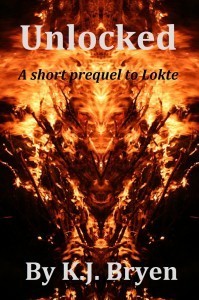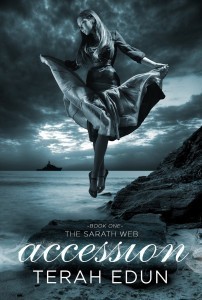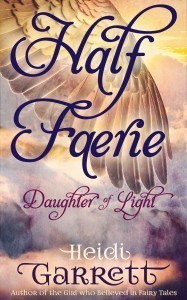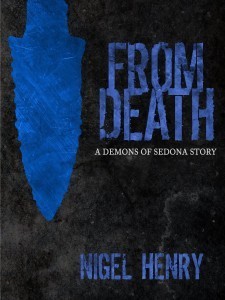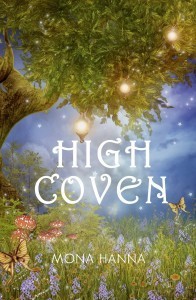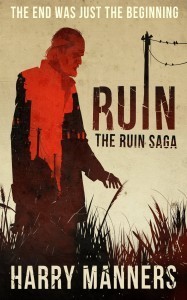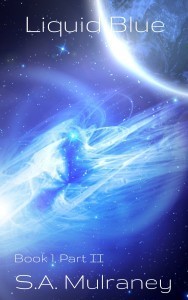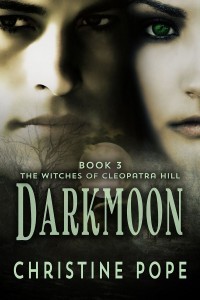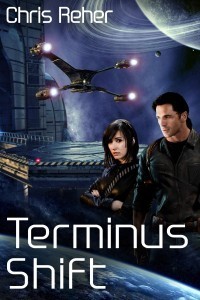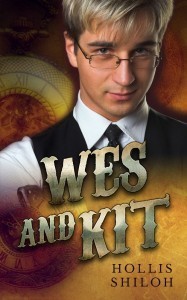Cora Buhlert's Blog, page 115
September 4, 2014
An Interview and some Odds and Ends
First of all, I’ve been interviewed again by fantasy writer Judy Goodwin at My Writerly World. I talk quite a bit about research and the Silencer series.
Over at Pegasus Pulp, I also talk a bit more about the eight hour fiction challenge and link to the results.
Finally, the Speculative Fiction Showcase has been really active these past few days. Heidi, Jessica and I have posted lots of great content such as interviews with Stan Smith and Vincent Trigili and new release spotlights for Warriors by C. Gockel and The Chains of War by Dean F. Wilson. And we’ve got a lot more stuff planned, so keep checking back for new releases, author interviews, guest posts, speculative fiction links and more.
 Send to Kindle
Send to Kindle
August 31, 2014
The Gamora movie, guest-starring the “Guardians of the Galaxy” or Germany discovers the Marvel Cinematic Universe
Back in April, I noted that the publicity campaign for Captain America: The Winter Soldier here in Germany as well as reviews of the film seemed to focus far more on Black Widow than on Captain America, the actual star of the movie.
Back then, I assumed that the phenomenon was due to the fact that it’s kind of hard to sell a guy calling himself Captain America, who was created to fight Nazis in WWII, to German audiences, so a butt-kicking Russian ex-assassin turned superheroine was probably more palatable, particularly when played by Scarlett Johansson.
However, I noticed a similar phenomenon in the media coverage for Guardians of the Galaxy, which premiered in Germany this week. One of the comparatively few TV reports (apparently, covering period dramas of questionable historical accuracy such as some Volker Schlöndorff film about a Nazi general who is ordered to blow up Paris and doesn’t, because it’s so beautiful*, or a Dominik Graf movie about Friedrich Schiller having a threesome with two sisters** are considered more deserving of coverage in many quarters) breathlessly announced Zoe Saldana’s new movie Guardians of the Galaxy, followed by footage of Gamora kicking arse and being awesome, an interview soundbite of Zoe Saldana, the Zoe Saldana baby bump watch, more Gamora being awesome, some team footage and Vin Diesel saying “I am Groot”. All in all, it was certainly an interesting take on the movie.
Now Zoe Saldana is certainly the most famous among the main Guardians actors actually seen on screen (Bradley Cooper and Vin Diesel are only heard and not in German, where Rocket Raccoon is dubbed by Fahri Yardim), since nobody here knows Chris Pratt, cause Parks and Recreation does not air in Germany. Indeed a rather good Austrian TV report about Guardians of the Galaxy and the Marvel Cinematic Universe in general (a phenomenon the German language cultural press is only now taking note of) called Chris Pratt “a largely unknown actor”, while the review in my local paper (amazingly the reviewer actually enjoyed the movie) meticulously listed every single supporting part Chris Pratt previously played.
So it certainly makes sense for German reports to focus on Gamora rather than Peter Quill, it’s nonetheless notable that German coverage of two subsequent Marvel movies focussed more on the female leads, both of whom just happen to be tough arsekickers with a shady past, rather than on the male stars. Add in the fact that Luc Besson’s Lucy – which isn’t a Marvel movie, but features Scarlett Johansson kicking arse and coincidentally hints at how awesome a Black Widow solo movie would be – is currently sitting at the top of the German cinema charts and that Maleficent, another female led fantasy film, was also a big success in Germany and I think it’s safe to say that German audiences do like female led action movies and heroines who kick arse.
While on the subject of the much maligned Lucy (yeah, so the scientific premise is nonsense, but then it’s not as if there aren’t plenty of movies full of nonsense science), here is a great post in defence of the movie by urban fantasy writer Kyoko M.
Indeed, the most fascinating thing apart from the Gamora focus is that even the notoriously snobby high-brow cultural press here in Germany completely enjoyed Guardians of the Galaxy, as these reviews from Spiegel Online, the Süddeutsche Zeitung (which even detects some social and political criticism in the movie), Die Welt (which doesn’t quite understand the movie, but still believes it’s a masterpiece) and the Frankfurter Allgemeine Zeitung.***
In fact, a friend just recently noted that she hadn’t heard a single negative opinion about Guardians of the Galaxy anywhere. It seems to be that rare movie everybody seems to enjoy.
Though come to think of it, those high-brow cultural publications that actually lowered themselves to review The Avengers generally enjoyed it as well, as this Spiegel Online review as well as this marvelous review from the Frankfurter Allgemeine Zeitung show.
*It’s quite possible that what swayed the otherwise very obedient general was less the beauty of Paris and more the fact that there were better uses for explosives in late 1944 than blowing up a city. Besides, as the host of one of those cultural programs on TV said, that same general had zero qualms about rounding up and deporting Jews earlier.
**It’s doubtful whether Schiller ever really had a threesome with the sisters, all we know is that he wrote letters to both of them. But most certainly, Schiller and the sisters did not engage in a poly relationship in the modern sense.
***I now imagine Marcel Reich-Ranicki and Frank Schirrmacher spinning in their respective graves.
 Send to Kindle
Send to Kindle
August 30, 2014
Indie Speculative Fiction of the Month: August 2014
 It’s that time of the month again, time for “Indie Speculative Fiction of the Month”. And this month, the round-up will even be crossposted to the Speculative Fiction Showcase, a new group blog dedicated to all things speculative fiction.
It’s that time of the month again, time for “Indie Speculative Fiction of the Month”. And this month, the round-up will even be crossposted to the Speculative Fiction Showcase, a new group blog dedicated to all things speculative fiction.
So what is “Indie Speculative Fiction of the Month”? It’s a round-up of speculative fiction by indie authors newly published this month, though some July books I missed the last time around snuck in as well. The books are arranged in alphabetical order by author. So far, most links only go to Amazon.com, though I may add other retailers for future editions.
Once again, we have a broad spectrum of titles, featuring science fiction, space opera, epic fantasy, Steampunk, paranormal romance, dystopian fiction, post-apocalyptic fiction, urban fantasy, Chinese mythology, Norse mythology, fairytale retellings, zombies, shapeshifters, shamans, witches (lots of witches for some reason), angels and demons, time travel, superpowers, sea adventures and much more. We’ve even got a bonafide Campbell award nominee this month.
This is also one of the most international “Indie Speculative Fiction of the Month” round-ups, featuring writers from the US, UK, Australia, Canada, Ireland, Poland and Thailand.
As always, I know the authors at least vaguely, but I haven’t read all of the books, so Caveat emptor.
And now on to the books without further ado:
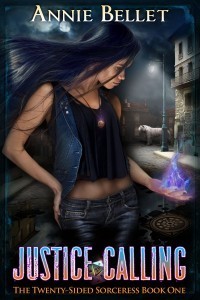 Justice Calling by Annie Bellet
Justice Calling by Annie Bellet
Gamer. Nerd. Sorceress.
Jade Crow lives a quiet life running her comic book and game store in Wylde, Idaho. After twenty-five years fleeing from a powerful sorcerer who wants to eat her heart and take her powers, quiet suits her just fine. Surrounded by friends who are even less human than she is, Jade figures she’s finally safe.
As long as she doesn’t use her magic.
When dark powers threaten her friends’ lives, a sexy shape-shifter enforcer shows up. He’s the shifter world’s judge, jury, and executioner rolled into one, and he thinks Jade is to blame. To clear her name, save her friends, and stop the villain, she’ll have to use her wits… and her sorceress powers.
Except Jade knows that as soon as she does, a far deadlier nemesis awaits.
Justice Calling is the first book in The Twenty-Sided Sorceress urban fantasy series.
 Geodesic Episode 1: Fabio by Morton Blake
Geodesic Episode 1: Fabio by Morton Blake
When Fabio Velazquez arrives on the secretive military base on Io, he knows two things: one, that he’s had his memories erased and modified and two, that he has a secret. Except because of one, he has to piece together from bits of memories what two is.
The portents aren’t good: he’s hated by his fellow soldiers, responsible for “the greatest fuck-up in military history”, traitor and human guinea pig. Yet, he managed to be trusted with a secret so big that the military has almost killed him and still haven’t gotten their hands on it.
His nickname might be Escape Artist, but in the hostile environment of Io there is no way to escape. Or so the military thinks.
New York, 1985.
Sophia Parks is used to battling demons. But when she is approached by a girl who needs help banishing a demon, Sophia struggles to help her, and must go up against the most powerful demon she’s ever faced. To fail might mean losing everything she loves . . .
This short prequel to “Lokte” (coming in September) delves into Sophia’s past, and incorporates some unlikely characters from the novel.
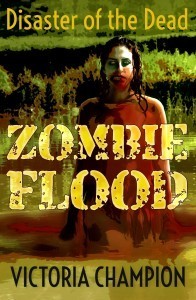 Zombie Flood: Disaster of the Dead by Victoria Champion
Zombie Flood: Disaster of the Dead by Victoria Champion
A storm of undead is coming to the Louisiana swamps.
In the churning fury of the strong winds and rain of a natural disaster, an unnatural contagion is born. The sickness is carried within the storm surge’s relentlessly advancing tide.
As the first wall of the hurricane assaults the lush swampland, humans and innocent creatures are infected. Their resultant mutation brings with it an insatiable and shocking hunger. The savage herd of monstrosities goes in search of food.
Guided by one-hundred and thirteen mile-per-hour winds at their backs, the gruesome horde slogs towards a small rural town known for its alligator tours.
Stranded by the flooding in Lustre Perle, federal agents fight alongside local Cajuns against the horrifying and deadly invasion, and although they are from different worlds, they must overcome their prejudices, fears, and distrust and rely on each other if they are to survive.
One hundred and twelve years after the fall, the Republic of Texas is built on two foundations: total freedom and total responsibility. A law broken means a strike against the lawbreaker. Five strikes means execution. The only hope for the law breaker is to escape Texas—to go Striker—before justice comes for them.
Sixteen-year-old Karas Quick has never had it easy. The daughter of a Striker and an alcoholic mother, she’s gotten everything she has the hard way — even the strike on her neck. Yet try as Karas might to stay above-board with the authorities, there are some things you just can’t plan for.
Like seeing the face of her long-lost father paraded through the town square in chains.
In the blink of an eye, Karas’s life changes forever. Potential strikes be damned, she has to see her father one last time. What she discovers propels her upon an unimaginable journey, one she can only hope she’ll survive.
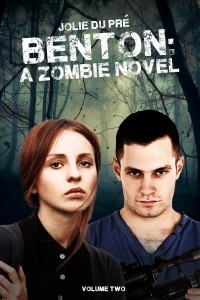 Benton: A Zombie Novel, Volume 2 by Jolie du Pré
Benton: A Zombie Novel, Volume 2 by Jolie du Pré
Jennifer Benton’s family died in the first wave of zombie attacks. She found friends in a small group of survivors, and she’s fallen in love with Mark, the charismatic young man leading them.
Though the survivors now have a fragile sense of safety, some of Jennifer’s new friends die, and she has a beautiful blonde rival. Jennifer thinks jealousy will bring Mark back.
She’s wrong.
And now everything may be over—for everyone…
Part 2 of the Benton series, following Benton, Volume 1.
Sixteen-year-old Katherine Thompson wasn’t trained to rule a coven. That was her sister – perfect, beautiful Rose. But when a mysterious plane crash kills off the heir presumptive of the Sandersville coven she has no choice.
After stepping in to fill her sister’s shoes, Katherine realizes she didn’t have a clue – faery wars, depressed trolls and angry unicorns are just the beginning.
For centuries, her family has served the high Queens on both sides of the Atlantic but it is a well-known rule that mid-level witches stay away from high-level Queens.
But when Katherine’s youngest cousin vanishes without a trace in the Atlanta court and no one wants to investigate, Katherine decides to step into the darkness on her own. She will soon discover that nothing, especially in a queen’s court, is as it seems.
Melia is an eighteen-year-old half-faerie, half-mortal who longs to fly like the full-blood faeries. She also yearns for a life that’s truly her own, which might prove more difficult than sprouting wings. Her faerie mother practices black magic and her mortal father plots to bring war to the enchanted world. No matter how she yearns to distance herself from them, Melia can’t seem to escape their long shadow.
After the half-faerie is accused of being her father’s spy, her best friend advises a trip to the Illustrator. The mysterious woman marks Melia’s forehead with an ink blotch, then claims the indigo stain will call a green-eyed stranger from distant lands to the half-faerie’s aid. Spooked more than comforted, Melia dismisses the woman’s words. Rather, she travels to the mortal world to confront her father.
The fallout from her visit destroys what’s left of their already fractured family. Melia’s mother is unforgiving. The punishment she metes out will leave her middle daughter torn between guilt and ecstasy, challenge the bonds between three sisters, and complicate Melia’s relationship with the green-eyed stranger. The half-faerie is sucked deeper into the vortex of her family’s dark history when her younger sister pursues their parents’ damning legacy. Melia and the green-eyed stranger must stop her–or risk the rise of Faerie’s darkest queen.
Daughter of Light is a spinoff of the 14th century French fairy tale, Melusine. A high fantasy with fairy tale elements, it’s great for readers who enjoy fairy tales retold. The variety of female characters, layered story, and intriguing cosmology make it a great read for young adult and older readers.
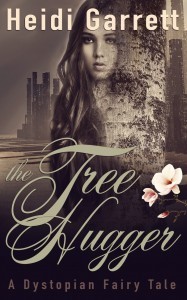 The Tree Hugger by Heidi Garrett
The Tree Hugger by Heidi Garrett
Born and raised in the Free Territories, Magnolia Lee Winthrop, prefers the company of trees and nature to spending time with most people. Although she’s not much of a talker, she’s got plenty of strong opinions about life and how it should be lived, just like her mother and grandmother.
After the settlement’s forest farm is burned to the ground, Magnolia’s life can never be the same. To cope with her grief, she’ll have to leave behind everything she’s ever known and loved for a hard journey through a foreign, paved, and abandoned world.
The Tree Hugger is a dystopian retelling of Hans Christian Andersen’s “The Dryad.”
When science meets Chaos, what could go wrong?
Bohdi Patel is keeping the revelation that he is Chaos incarnate a secret, and handling the revelation about as well as one would expect. He’s in a downward spiral: losing his lease, totaling his car, and trying to keep everyone he cares about at arm’s length.
Veterinarian Amy Lewis is wondering what happened to the funny, flirty, curious Bohdi she knew in the land of the Norns. He’s become moody and sometimes cruel. She is definitely glad she didn’t become romantically entangled with him … most of the time.
When tragedy strikes Amy’s beloved mutt Fenrir, and Odin strikes Bohdi’s best friend Steve, they have to work together again. Amy’s knowledge of science, Bohdi’s talents for theft, and both of their survival skills are put to the test. But more than Steve and Fenrir’s lives are at stake. Amy and Bohdi may unlock the key that saves mankind from the gods … or bring about the apocalypse.
This is Part V of the I Bring the Fire series.
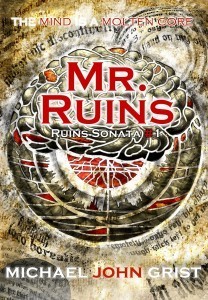 Mr. Ruins by Michael John Grist
Mr. Ruins by Michael John Grist
In the tsunami-drenched dregs of a ruined future world, ex-Arctic marine Ritry Goligh is a loner with no roots, future, or ambition. He works as a diver of minds in the floating slums beyond the tsunami wall, smoothing language injects into gray matter. He spends his nights in an alcohol-fueled blur of petty violence and sex, until a shadowy figure with an excellent hat drops the corpse of Napoleon at his feet.
This is Mr. Ruins. He offers Ritry a better future, and in the rusted hull of a belly-up cathedral ship, in the abandoned remnants of old-war infrastructure, unveils an awesome truth: the memories of the dead linger on, and can be consumed for strength. Ritry signs on, and with that new strength begins to grow again.
But Mr. Ruins asks a terrible price. In a metaphoric world where memory is magma and consciousness is a chord of seven lost marines battling through the mind’s molten core, Rit must learn to fight for his sanity, and the sanity of every person he loves. Because Mr. Ruins knows them now, and wants them for himself.
Every year Tobin North and his father make the months-long trek to Miner’s Quarry on behalf of their village. They always return home with a fresh supply of encircling crystals, the one item that can protect humans from the undead demons that swarm outside their doors every night. But this year is different, because this year Tobin and his father were told they aren’t getting a new batch of crystals. To make matters worse, their old supply is running low, which means their village is on borrowed time.
And time’s almost up, because families are starting to die.
This is book 2 in the Demons of Sedona series, following The Healer’s Pact.
Ariel is getting used to being a new mother and is excited to see her best friends Hallie and Sean again. She just wants to spend time with them and relax and hear about their wedding. Unfortunately, relaxing is the last thing any of them can do on this visit.
Thrust into a new place, the High Witches are delighted to find the fourth—but the circumstances couldn’t be worse. A group of men are determined to stop them from casting a spell that could change the world, bringing immense joy but also great disaster. The risks of the spell might be beyond their ability to handle.
A great darkness is coming. It will take more than two High Witches to stop it: it will take a coven.
High Coven is the third and final book in the High Witch series, following High Witch and Witch Emerging.
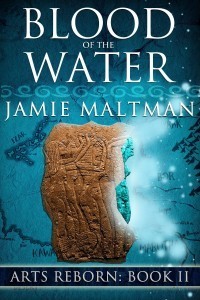 Blood of the Water by Jamie Maltman
Blood of the Water by Jamie Maltman
Fire returned in a blaze of war and destruction.
What will Water bring to the one who finds her?
A slave dreams of freedom for all.
An aristocratic soldier yearns for power.
A sculptress covets revenge.
But the painter she loves urges her to use her Talent for peace.
When those aims collide, new friends join in the desperate race through foreign lands and ancient ruins to uncover knowledge of the mysterious Damoz. What do they want? Can they be stopped?
Blood of the Water (Arts Reborn: Book II) continues the journey of Simon, Elysia and Persei that began in Brush With Darkness.
Before the End there had been great cities, knowledge, power, bustling billions. All silenced when the vast majority of the world’s population, quite suddenly, vanished.
After forty years, an ominous force is laying waste to the survivors, and famine has struck. Norman Creek is struggling to feed the many mouths of New Canterbury, which clings to life while thousands starve or burn out in the wastes. Yet still they collect books, computers, art, saving all they can. They have a mission: to begin again.
And Norman has a destiny: to lead them, prophesized at birth to bring about the return of civilization. But all he ever wanted was to disappear into the crowd, and turn his back on the legend.
When a barbaric horde sets out to conquer the British Isles, and past misdeeds spell the city’s doom, Norman must overcome self-doubt and mount their final stand, as the last war of mankind begins.
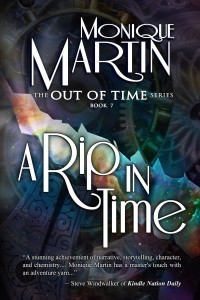 A Rip in Time by Monique Martin
A Rip in Time by Monique Martin
An old enemy returns threatening to destroy not just Simon and Elizabeth but the timeline itself. To keep that from happening, they travel back to 1888 London to find Jack the Ripper…and save his life. If he dies, the timeline changes, everything they know and their lives together, will be lost. But they soon discover the only thing harder than saving a monster is finding him.
The Crosses are back in book 7 of the Out of Time Series.
Part II continues the story of Caeden Llewellyn. With Caeden’s apparent death, his father and best friend investigate what caused the Jupiter mining rig malfunction. Meanwhile, a not-so-dead Caeden is reunited with a long lost relative and discovers the creatures behind a plot that could bring war to Earth’s solar system.
Liquid Blue, Part II is 20,000 words and the second of three parts. Liquid Blue, Part I is here.
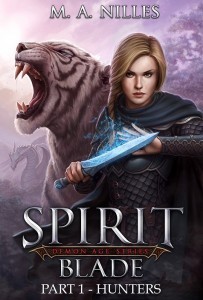 Hunters and Chains by M.A. Nilles
Hunters and Chains by M.A. Nilles
Part 1 of 5
Nadia wants no part of the shevoru, the dark blade that has gained power by possessing the souls of raging half-bloods and monsters she has killed. Since learning the secret of the dagger and the spell that the sorcerers taught her to use, she has freed herself from its influence. She is finally ready to make the journey to rid the world of its evil by using the power of an ancient device.
The Adept leaders desire the power of the dagger to serve their purposes, but the messenger they sent to retrieve it from Nadia is the last person she wants to see…
Part 2 of 5
Nadia wants no part of the shevoru, the dark blade that has gained power by possessing the souls of raging half-bloods and monsters she has killed. Since learning the secret of the dagger and the spell that the sorcerers taught her to use, she has freed herself from its influence. She is finally ready to make the journey to rid the world of its evil by using the power of an ancient device.
When Lord Je’Kaoron is taken captive by an enemy demonlord, Nadia is determined to free him, but she has to free herself first…
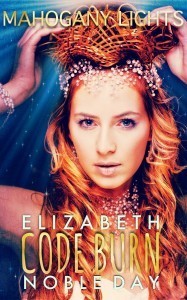 Code Burn by Elizabeth Noble Day
Code Burn by Elizabeth Noble Day
Everyone in the small, secluded town of Mahogany has a Gift — including absorbing electricity, Knowing the future, putting people to sleep, and causing earthquakes.
Lilliana Cooper, seventeen, is a Fire Wielder. When an ominous red streak appears in the sky, Lilliana’s Gift changes. Instead of releasing fire from her palms, her entire body bursts into flames. Code Burn, a twenty-four hour time period where Gifts are amplified, has begun.
A lantern can end Code Burn and restore Mahogany back to normal — but it is missing.
With people like Belle (who has a job ringing the bells in the bell tower but has no sense of rhythm), Darlene (Lilliana’s grandmother who recently returned after a long absence. The last time Lilliana saw her, a man died in a fire), Boris (an alarm technician who uses hammers to crush alarms — because that’s how you stop an alarm from ringing, right?), and Francis (the shoe salesman who doesn’t wear shoes), Lilliana navigates Code Burn and searches for a way to end it — before it causes Mahogany permanent damage.
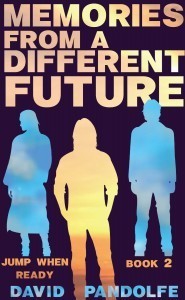 Memories from a Different Future by David Pandolfe
Memories from a Different Future by David Pandolfe
For Nikki, it feels like no time has passed since they rescued Henry’s sister from her abductors. After all, in the in-between realm, time is completely different than for those still “living.” Even though it’s been almost twenty years, only lately has Nikki started crossing between realms again. She’s been checking on Ian—the person they knew as Curtis before he jumped into a new life. Nikki hasn’t admitted it to the others but she’s been curious. Could Ian’s life really be as good as it seems? Can she find the courage herself to try the other realm again despite what happened last time?
When Nikki suddenly starts receiving ghostlike visits from Curtis—all these years since he returned to the physical realm—she can’t imagine how it’s possible. She also realizes it has to mean something serious. Nikki soon learns that, three days from now, an incident on Earth will end Curtis’s new life. Now, Nikki, Henry and Jamie must find a way to alter the outcome of a future event only they know will take place. They’ll also have just minutes to make that happen. Otherwise, Curtis is going to die again, taking with him any hope Nikki and her friends had for starting over.
This is the sequel to Jump When Ready.
The answer to the end lies at the beginning….
One hundred and fifty years ago, a terrible curse descended on the Wilcox clan, dooming generations of women to an early death should they bear a child to the bloodline of Jeremiah Wilcox. Now Angela McAllister is carrying Connor Wilcox’s child, and if she can’t find a way to break the curse, that same doom will fall upon her.
The solution to her dilemma lies somewhere in the past—her own, and that of the woman who cast the curse so many years before. Angela’s quest to find the answers she needs will transform the lives of everyone she knows, Wilcox and McAllister alike, and will forever change everything she has ever believed about herself.
This is Part 3 of the Witches of Cleopatra Hill series, following Darkangel and Darknight.
Seth Kada, a deep-cover agent working for the Commonwealth, has tracked a group of rebels to the remote Tayako Orbiter. But before he can seize them, the rebels are captured by a powerful rival faction and spirited away.
Seth manages to re-capture one of the rebels, a subspace navigator named Ciela, and soon realizes that her crew’s origin and purpose are far more pivotal than anyone could have suspected.
Caught up in a violent clash between rebel factions, Seth and Ciela’s divergent loyalties must be put aside to prevent the destruction of a peaceful civilization – and find her people before their ultimate destiny is realized.
 Watch Over Me by Alice M. Roelke
Watch Over Me by Alice M. Roelke
On a grasslands world, a hero’s daughter falls for a shape shifter—the one man she can never have.
When a shape-shifter attacks 15-year-old Meri, a mysterious guy named Porse comes to her rescue. He’s also a shape-shifter—the friend of Meri’s hero, the dead freedom-fighter named Balile.
When Porse tells Meri that she’s really Balile’s daughter, and the current ruler wants her dead, it turns her world upside down. Porse brings her to a town hidden from danger in the midst of the grasslands. There she grows up, making friends and enemies and meeting her only living relative.
She also inherits her father’s blue sword—and falls increasingly in love with Porse, the one man she can never have. Consumed by her first love for her rescuer and friend, Meri struggles to find her place in the world, all the time knowing some will always wish to kill her.
Sometimes it seems as though only Porse stands between her and danger, and he’s the most trustworthy person in the world. But is he? Meri would give anything to have him return her feelings, but he claims he doesn’t. Yet he gives off mixed signals.
And will he always be here to protect her like she wants to believe, or will he disappear without a moment’s notice, the way her aunt claims?
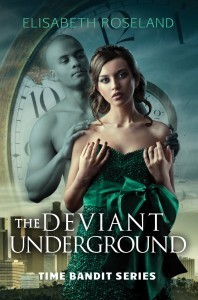 The Deviant Underground by Elisabeth Roseland
The Deviant Underground by Elisabeth Roseland
Even with the ability to stop time, you still can run out of it.
Kathryn should be institutionalized or incarcerated.
That’s what happens to deviants—people born with unusual abilities. And if the government knew she can teleport and stop time, she can say good bye to her freedom. Not that her life is all that great anyway. Her inability to control her gifts forces her to keep everyone at a distance. Few friends. No meaningful romantic relationships. Until Susan introduces her to Charge, that is.
When the 6’4” guy with the caramel-colored skin and million-watt smile shows up at her door, she lets her guard down. What she discovers is that her best friend and her new lover have gifts of their own, and there’s an entire underground network of undetected deviants living freely in society. Kathryn’s brought into the fold with open arms, and she’s finally found something she’s never had—a family.
But now, people are disappearing. Some come back weeks later with strange scars, sutured wounds, and missing limbs, with no memory of what happened. Some don’t come back at all.
When Charge becomes the next victim, Kathryn is willing to teleport to the edge of the world to find him, but confronting the mastermind behind the kidnappings puts her life in jeopardy. And when the rescue attempt goes horribly wrong, she wonders if dying might have been a better idea.
Warning: This book contains teleportation, mind control, and sparks that fly in sexy–and possibly deadly–ways.
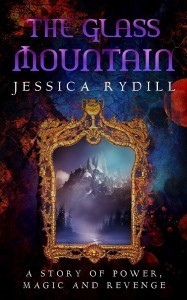 The Glass Mountain by Jessica Rydill
The Glass Mountain by Jessica Rydill
Now aged sixteen, Annat is living in the city of Masalyar and training as an apprentice shaman. Struggling with the pangs of first love and a wish for freedom, she is horrified to see the crows flying over her city. Something she thought destroyed for ever has risen again: a spectre from the past.
When her brother disappears, she and her aunt set out to find out what has become of him. But Annat is caught and imprisoned in the Glass Mountain, a place from legend.
A powerful Magus needs their souls and their father’s heart to cast his greatest spell, to bring a dead man to life. Unless he can be stopped, Annat, her brother and their father will die; and the country will be overthrown.
But there is something hidden in the Mountain that will change their lives. They must fight to protect their own world, and to save another: one so small it can be hidden in a suitcase.
This is the sequel to Children of the Shaman.
Wes has a soft heart—even if it is a gear heart from when he was mechanicalized during the war. Now close to homeless and in desperate straits, he still finds himself taking on a stray dog—and helping out an injured man he stumbles across in an alleyway.
That’s how he meets Kit. A harmless, gentle clock repairman with a heart condition of his own, Kit is in danger…because he’s working on a certain clock.
He hires Wes to protect him until the danger is past…whatever its cause. But they find their feelings for each other are becoming too strong to ignore, despite the danger.
When a chance to solve the mystery presents itself, Wes finds he might just lose the man he’s come to love…if he can’t find Kit in time.
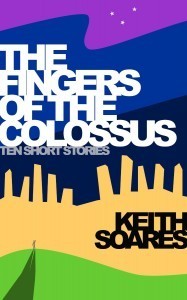 The Fingers of the Colossus by Keith Soares
The Fingers of the Colossus by Keith Soares
From the author of The Oasis of Filth comes a collection of ten short stories covering science fiction, fantasy, horror, and revenge. Includes:
The Space Between – One in a million odds can seem a lot more dangerous when you’re millions of miles from home.
The Last – When you can’t remember your past, do you still have a future?
The Vacancy of Dreams – A prequel story in the world of The Oasis of Filth.
Black Fire – Of all the mages, Huldrych was, by far, the least respected, and for one simple reason: he was incapable of producing black fire.
All That You Know is Lost and Abandoned – An innocent conversation is one way to pass the time, even for those who may not be innocent.
Tilting – In the frigid waters off Kodiak, Alaska, a man can lose himself. Or be lost.
The Fingers of the Colossus – Failure is not an option for a colonel in the queen’s forces, even when the entire planet may be against him.
Time in Time – Some things are never really lost.
Have a Seat by the Fire – Angela Vengaza sits in a small house in the middle of nowhere on a mountainside, hoping to hold on for an hour.
Walking on the Spot – A grandfather and grandson, like mirrors through time, debate fate before taking an important journey.
 The Archer Who Shot Down Suns: Scale Bright Stories by Benjanun Sriduangkaew
The Archer Who Shot Down Suns: Scale Bright Stories by Benjanun Sriduangkaew
A sampler of short stories taking place before and connected to SCALE-BRIGHT in chronological order. Chinese mythology retold from the time of humanity’s creation to contemporary Hong Kong.
“The Crows Her Dragon’s Gate” (first published in BENEATH CEASELESS SKIES, 2013. Ed. Scott H. Andrews). The story of Xihe, the mother of suns, when she was young and the world was new: how she met her husband, lost herself, and found it again.
“Woman of the Sun, Woman of the Moon” (first published in GIGANOTOSAURUS, 2012. Ed. Ann Leckie). Houyi rose in heaven, bow and arrow in hand: the hunt was her joy, the slaying of demons her delight. But most delightful was a serving girl called Chang’e.
“Chang’e Dashes from the Moon” (first published in EXPANDED HORIZONS, 2012. Ed. Dash). Chang’e has been a prisoner on the moon while the world turns and cities rise. For centuries Houyi has looked for a way to free her wife, and now she has found it in a distant grand-niece: a young mortal woman named Julienne.
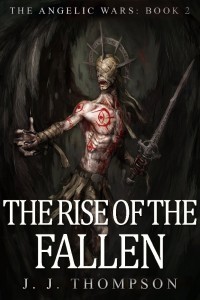 The Rise of the Fallen by J.J. Thompson
The Rise of the Fallen by J.J. Thompson
Thirteen year old Christopher Wright was a kid from the streets. When word got out that he could heal with a touch, a gang known as Talon tried to recruit him. When Chris turned them down, the gang attempted to take him by force. On the run, Chris met Judge Hawkes, the head of a mysterious group known as the Angelic Dominion. The judge informed the skeptical teen that he was one of a group of young people who had been born with the souls of angels. They had been sent to Earth to stop the forces of Hell from bringing about the Apocalypse.
To escape Talon, Chris reluctantly accompanied the judge back to his home to learn that he had, in fact, been telling the truth. He met others like himself and discovered that he wasn’t simply the bearer of an angel’s soul. His was the soul of one of the very first archangels: Sariel, brother of Michael and Lucifer.
Doomed to dwell in Purgatory and guard the Gates of Heaven, Sariel is determined to stop his Fallen brother’s forces here on Earth before they can destroy humanity and march on Heaven itself.
This is part 2 of the Angelic Wars series, following Confronting the Fallen.
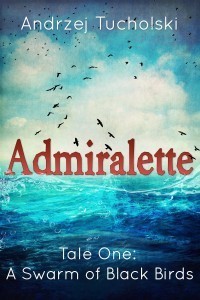 Admiralette – A Swarm of Black Birds by Andrzej Tucholski
Admiralette – A Swarm of Black Birds by Andrzej Tucholski
Smart and brave Sephira, the Admiral’s daughter, believes that she can handle anything.
No one warned her, however, that a massive mutiny is about to rage across her floating country. Powerful social and political players clash and exploit ancient sea-faring traditions in order to destroy the stability of the multi-cultural Fleet. Will Sephira be able to diffuse this time bomb? Or will the demons of the past catch up with the current events and make things even worse?
In order to save her nation, Sephira embarks on a wind-powered adventure full of ocean breezes, strong sun, and true friendship.
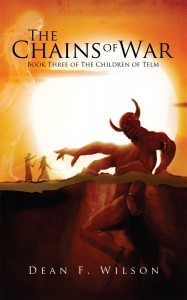 The Chains of War by Dean F. Wilson
The Chains of War by Dean F. Wilson
THE FINAL HOUR. THE FINAL FIGHT. THE FINAL WAR.
The first of Agon’s chains has broken, and the others are straining. It is only a matter of time before he is free, before the world is engulfed in chaos and death.
There are few left to stop him. Most of the gods can only sit and watch in horror from their prison in the heavens, but the resurrection of the father god Corrias gives the people of Iraldas a sliver of hope, a fighting chance.
Yet the memory of Corrias’ failure to defeat Agon in ages past plays heavily on all minds. Many know that it is only the might of the Warrior-god Telm that can defeat the Beast. That god is dead, but his power lives on in his bloodline, in Ifferon and others like him, and they are tasked with waging a final war against the Beast.
Enter the world of Iraldas. Break the Chains of War.
This is the third book in the Children of Telm series, following The Call of Agon and The Road to Rebirth.
 Send to Kindle
Send to Kindle
An Interview and Introducing the Speculative Fiction Showcase
I’ve been interviewed at the Speculative Fiction Showcase and talk about writing, food, movies, recycling and speculative fiction, of course.
This reminds that I haven’t actually talked about the Speculative Fiction Showcase yet. The Speculative Fiction Showcase is a group blog dedicated to all things indie speculative fiction, run by Heidi Garrett, Jessica Rydill and myself.
The Indie Speculative Fiction of the Month round-up will be crossposted there and I’ll also be posting a weekly round-up of speculative fiction links. We’ll also be having new release spotlights, posts on all sorts of speculative fiction related topics such as Jessica Rydill’s WorldCon report, guest posts like this one by British SF author Harry Manners about writing post-apocalyptic fiction and author interviews. If you want to be featured, drop us a line.
And since we needed a guinea pig for the author interviews, I ended up doing the first interview.
So check out the Speculative Fiction Showcase on a regular basis, cause we’ve got lots of good stuff planned.
 Send to Kindle
Send to Kindle
August 28, 2014
New Crime Short Available: The Cork and the Bottle
I actually expected the next new release announcement to be for the next two (yes, you read that correctly) installments in the Shattered Empire series.
But instead I did another eight hour fiction challenge and wrote a short mystery (and yes, this time it is a proper mystery according to narrower US genre classification) called The Cork and the Bottle.
Over at the Pegasus Pulp blog, I have a more detailed post about how I came to write the story. But for now, enjoy:
The Cork and the Bottle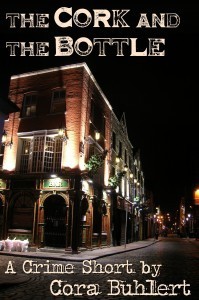 When the landlord of The Cork and the Bottle ends up dead in a puddle of blood on the floor of his own pub, the case seems clear. The teen burglars who broke into the pub to steal the contents of the till are the culprits.
When the landlord of The Cork and the Bottle ends up dead in a puddle of blood on the floor of his own pub, the case seems clear. The teen burglars who broke into the pub to steal the contents of the till are the culprits.
But there are things about the case that just don’t add up. And eventually, Detective Inspector Helen Shepherd begins to suspect that the killers are to be found much closer to home…
For more information, visit the The Cork and the Bottle page.
Buy it for the low price of 0.99 USD, EUR or GBP at Amazon US, Amazon UK, Amazon Germany, Amazon France, Amazon Spain, Amazon Italy, Amazon Canada, Amazon Australia, Amazon Brazil, Amazon Japan, Amazon India, Amazon Mexico, Kobo, Barnes & Noble, Apple iTunes, Scribd, Casa del Libro, Inktera, txtr, Thalia, Weltbild, Hugendubel, Der Club, Libiro, Nook UK, DriveThruFiction, OmniLit/AllRomance e-books, Flipkart, e-Sentral, You Heart Books and XinXii.
 Send to Kindle
Send to Kindle
August 25, 2014
More WorldCon and Hugo Links
We’re still talking about WorldCon and the Hugos, so here are some more links:
At The Daily Dot, Gavia Baker-Whitelaw compares WorldCon with Nine Worlds, a newer multi-fandom con also held in London, and detects a notable generation gap.
Bethan Jones also describes a notable generation gap as well as a gap between media and book fandom in her LonCon3 write-up. She also talks about attending a very good panel on diversity and internationalism.
Bertha Chin also tackles the diversity issue in this great post, wherein she describes repeatedly having to turn down participating in a diversity panel she didn’t feel qualified for and how she felt she was mainly assigned that panel because of her Asian surname.
Ana S. offers an extensive con and panel report at Things Mean a Lot.
At Staffer’s Book Review, Justin Landon analyses Hugo voting behaviour in detail as well as the influence of the Sad Puppies (who seem to be a bloc of sixty to seventy nominators/voters). Some interesting stuff there, though he can’t resist a jab against Seanan McGuire.
The big takeaway from Justin Landon’s post, however, is how important it is to nominate for the Hugos (and every LonCon member can nominate next year) to prevent future Sad Puppies and other rabid fans. Indeed, I already have a document where I list anything genre related that catches my eye as a potential nominee under the respective category, so I don’t have to strain my memory next year at nomination time.
 Send to Kindle
Send to Kindle
August 23, 2014
It came from the compost heap or The mystery plant from outer space
As you may or may not know, we have a vegetable garden. We also have a compost heap. And sometimes, plants sprout in said compost heap, which is only natural, since compost is intended for fertilizing.
Most of the time, the plants sprouting in the compost heap are just weed, but occasionally you get something useful like a pepper or pumpkin plant.
This year, the compost sprouted what looked like a pumpkin or maybe a zucchini plant, so we rescued the seedling and planted it in the vegetable garden proper, where it thrived and grew to quite epic proportions.
However, once the plant began developing fruit, those fruit turned out to be not zucchini or pumpkins but something quiet different and rather weird.

The mystery squash in the garden. It sure is pretty, but what exactly is it?

Two more mystery squashs.
I asked the internet for ideas regarding the identity of the mystery fruit and the consensus was that it’s probably some kind of summer or maybe winter squash, probably a hybrid.
As for how they came to be, in the fall we always buy pumpkins and squashes for pickling and cooking from a local farmer (they’re cheaper to buy than to cultivate). This year, we also had a decorative arrangement of smaller and particularly colourful squashes and gourds next to our front door in fall and early winter, since the farmer where we always buy the pumpkins and squashes has a very broad selection. You can see some photos at the end of this post here.
After preparing the pumpkins and squashes, the seeds and other remnants landed on the compost heap. And once the decorative squashs and gourds went mouldy, they ended up on the compost heap as well.
And from that primordial soup of gene material arose the mutant squash from outer space.
 Send to Kindle
Send to Kindle
August 21, 2014
More reactions to the 2014 Hugo Award winners
It’s getting really difficult to find new titles for all of these Hugo related posts.
Besides, I forgot to mention that the 1939 Retro Hugos have been awarded as well. Now I have to confess I don’t quite get the point of the Retro Hugos, particularly when none of the nominees are still alive to enjoy them. Never mind that the Retro Hugos will always be coloured by hindsight or does anybody honestly believe that two early shorts by a teenaged Arthur C. Clarke and Ray Bradbury published in fanzines would ever have made it onto a Hugo ballot in 1939, let alone that one of them would have won?
In general, the results are a mix of the bleeding obvious such as John W. Campbell’s classic “Who Goes There?” winning in the best novella category or Orson Welles’ classic radio adaption of H.G. Wells’ War of the Worlds (yes, that radio adaption) winning in the best dramatic presentation category and the utterly mind-boggling such as a Clifford D. Simak story I’ve never heard of beating Robert E. Howard’s excellent Pigeons from Hell as well as the Henry Kuttner’s highly amusing Hollywood on the Moon and C.L. Moore’s Werewoman. Or how about an early story by a teenaged Arthur C. Clarke published in a fanzine beating Lester Del Rey’s Helen O’Loy (which I dislike for its creepy sexism, but it’s still a minor classic).
I’m also surprised at the results in the best novel category with The Sword in the Stone and C.L. Lewis’ Out of the Silent Planet both beating E.E. Smith’s Galactic Patrol (largely unreadable these days, but of enormous importance to the genre as such) as well as Jack Williamson’s Legion of Time (still readable) and Edgar Rice Burroughs’ Carson of Venus (ditto). I know a lot of people are fond of Lewis because of Narnia (which largely passed me by as a kid), but Out of the Silent Planet is pretty bad and doesn’t even have the significance of something like Galactic Patrol.
Now the Retro Hugos have been dispensed with, here are some more reactions to the 2014 Hugo Award winners from around the web:
At The Guardian, Hannah Ellis-Petersen offers a summary of the 2014 Hugos, though she neglects to mention Charles Stross, Mary Robinette Kowal and Sofia Samatar.
At The Daily Dot, Gavia Baker-Whitelaw offers a summary of the winners and controversies and points out that in spite of the alleged “greying” of Worldcon this latest slate of Hugo winners looks very different from the white male canon of previous years and is also finding their audience in different ways.
Jamie Todd Rubin points out that this year’s Hugo winner slate saved science fiction for him by restoring his flagging interest and faith in the genre. I guess many of us feel that way today.
Double Hugo winner Kameron Hurley reposts her two acceptance speeches at her blog for those who couldn’t hear them live. Some very good points about change, rage and the importance of words plus some bonus fuzzy llamas.
At Teleread, Paul St. John Mackintosh points out that the sad puppies came out looking badly out of their Hugo campaign and might have harmed their cause and credibility more than they furthered it.
Tim Hall makes a similar point at Where Worlds Collide and wonders whether the aim of the Sad Puppies campaign was truly to challenge a perceived leftwing dominance at the Hugos or whether the aim was to discredit WorldCon and the Hugos in the eyes of the fans of the Sad Puppies. Which strikes me as strange, because the Sad Puppies can (and probably already did) set up cons and awards of their own to hang out with likeminded people without discrediting those of the larger genre community.
At From the Heart of Europe, Nicholas Whyte offers some in-depth analysis of the Hugo voting and nomination stats.
Thea and Ana of Hugo-nominated The Book Smugglers offer a recap of their LonCon and Hugo experience with lots of pictures.
Ann Leckie, winner of the Hugo Award for best novel for Ancillary Justice, also recounts her WorldCon and Hugo Awards experience.
John Chu, winner of the Hugo Award for best short story for “The Water That Falls On You From Nowhere” recounts his Hugo experiences and reposts his acceptance speech.
The only thing that somewhat marred the otherwise excellent news from the 2014 WorldCon is that the 2016 WorldCon will be held in Kansas City, Missouri, a city whose main claim to SFnal fame is being thoroughly destroyed by a nuclear bomb in that infamous anti-nuclear war film The Day After in 1983, rather than in Beijing, capital of a country of one billion people, which has a huge if largely non-westernized SF fandom. Considering this comes after the 2015 WorldCon was awarded to Spokane in Washington (which has no claim to SF fame at all, as far as I can tell) over Helsinki and Orlando, it’s kind of obvious that many fans still haven’t grasped the significance of the “world” bit in WorldCon.
Jonathan McCalmont at Ruthless Culture had some thoughts about why holding two subsequent WorldCons in smaller US cities is not a good idea and why he feels there shouldn’t be two US WorldCons back to back at all. One potential solution might be a rule similar to the selection of football World Cup sites, since the FIFA rules state that two subsequent World Cups cannot take place on the same continent. Continents are perhaps a bit much in this case, but why no rule that two subsequent WorldCons cannot take place in the same country?
 Send to Kindle
Send to Kindle
August 18, 2014
The 2014 Hugo Awards Post
The 2014 Hugo Awards have been given out and the slate of winners is highly diverse and overall very good (detailed voting and nomination breakdown here), which is even more remarkable considering that the 2014 Hugo shortlist was probably the most controversial in ages. For some background, see my posts here, here and here.
My reaction, when I saw the list of winners this morning (I spent Sunday night writing and didn’t follow the announcements live, deciding I didn’t need the grief) very much matters that of Natalie Luhrs from The Radish: Faith in humanity (and fandom) restored.
The Hugo Award for best novel went – highly deservingly – to Ann Leckie for her Ancillary Justice. Now Ancillary Justice has made an almost unprecedented sweep of this year’s SFF awards, winning also the Nebula, Clarke Award and Locus Award for best first novel, making it the standout SF novel of the year. And indeed, Ancillary Justice stood heads above all of the other nominees in this category. Neptune’s Brood by Charles Stross finished in second place, which is not unsurprising, since he has many fans, even though I am not one of them (writing wise – I like Charles Stross as a person). Parasite by Mira Grant a.k.a. Seanan McGuire finishes in third place and the two most controversial nominees, the entire Wheel of Time series by Robert Jordan and Brandon Sanderson as well as Warbound by Larry Correia finish fourth and fifth respectively, proving that even a rabid fanbase (and one focussed only on one specific work or author) isn’t enough to win a Hugo without broader fandom support.
Looking at the extended nomination list, it turns out that Neil Gaiman was nominated for The Ocean at the End of the Lane, but declined, which is a pity since I liked that novel much more than any of the other finalists except Ancillary Justice. However, we cannot blame Neil Gaiman for either Wheel of Time or Warbound, since the novel that snuck onto the shortlist instead was Parasite. However, if you eliminated both Wheel of Time and Warbound, the best novel nominees would also have included The Shining Girls by Lauren Beukes and A Stranger in Olondria by Sofia Samatar, which would have made for a much stronger shortlist.
The short fiction categories look very good as well. Novella is a bit disappointing with Charles Stross winning for Equoid (sorry, but his work just doesn’t do it for me, even if it includes unicorns), followed by Six-Gun Snow White by Catherynne Valente, my personal favourite Wakulla Springs in third place and the two sad puppy candidates finishing fourth and fifth respectively. Personally, I found best novella the most disappointing category this year and voted “no award” in second place.
After being disqualified on technical grounds last year, Mary Robinette Kowal wins in the best novelette category for The Lady Astronaut of Mars. This wasn’t my first choice in the category (that would have been The Waiting Stars by Aliette de Bodard), but it’s one I’m happy with. I didn’t much care for the Ted Chiang story, but I know he’s very popular. I’d also love to congratulate the oft nominated but never winning old workhorse “No Award” for finishing in fifth place.
The Hugo for best short story went, pretty surprisingly IMO, to John Chu for The Water That Falls On You From Nowhere. Again, this wasn’t my first choice (that would have been Selkie Stories Are For Losers by Sofia Samatar), but one I’m very happy with. Indeed, John Chu’s short story was one of only two pleasant surprises in this year’s Hugo voter packet, the other being The Girl Who Loved Doctor Who in the graphic story category. Rachel Swirsky’s Nebula winning story If You Were a Dinosaur, My Love, which was among the most divisive nominees this year with people either loving or hating it, landed in third place, Thomas Olde Houvelt (which I wanted to love, but didn’t) in fourth.
The Campbell Award goes – again well deservedly – to Sofia Samatar. I’m a bit disappointed to see Benjanun Sriduangkaew finish in last place, since I like her work a whole lot. But then she was probably disadvantaged due to being the only pure short story writer on the list.
This makes three women, two writers of colour and one international writer winning in the fiction categories with only one winner a white man. Coincidentally, it also means that a piece of non-binary gender fiction and a piece of GLBT fiction are among the winners.
The rest of the winning slate looks similarly good. Best related work and best fan writer go to Kameron Hurley, again highly deserved. But then there were no bad choices for fan writer this year and indeed every single nominee would have deserved to win. Both art categories were taken by women, which I think is a first, with the wonderful Julie Dillon winning for pro-artist and Sarah Webb, who is only 19 years old, winning fan artist.
The editing categories also go to two women, Ellen Datlow and Ginjer Buchanan respectively. Lightspeed wins in the best semi-prozine category, while A Dribbel of Ink wins best fanzine. Personally, I would have preferred The Book Smugglers in that category, but it’s still an excellent choice.
In the short dramatic presentation category, the Red Wedding a.k.a. the Game of Thrones episode “The Rains of Castermere” knocks out umpteen reiterations of Doctor Who as well as Orphan Black. Judging by the nomination breakdown, the extended ballot would have included yet more Doctor Who, more Orphan Black, more Game of Thrones as well as Sleepy Hollow (didn’t work for me, but at least it’s something different), Fringe (Is that still on?) and Chris Hadfield performing “A Space Oddity” aboard the ISS, which would have been interesting.
Gravity a.k.a. Sandra Bullock moaning in space wins unsurprisingly in the long dramatic presentation category, since it’s exactly the sort of serious science fiction film that Hugo voters like. I’m surprised to see Frozen finishing in second place, but then I don’t get the love for this one at all. My personal No. 1 and 2 choices, Iron Man 3 and Pacific Rim, both finished lower than I expected, namely in third and fourth place. But then Iron Man 3 got a lot of backlash, though I personally enjoyed it quite a bit, and Pacific Rim, while fun, isn’t exactly deep. Looking at the extended nomination list, I’m a bit sad to see that my two non-mainstream nominations, Only Lovers Left Alive and The Congress didn’t even gather enough nominations for a mention, but then both movies didn’t get a US release until 2014.
Finally, the win for the XKCD strip Time in the graphic story category leaves me completely stumped, especially considering it knocked out such fan favourites as the excellent Saga and Girl Genius as well as the surprisingly lovely The Girl Who Loved Doctor Who. No I’m not the world’s biggest XKCD fan in general, though I find it amusing on occasion. But Time just left me scratching my head and wondering “What is the point?” In fact – and Randall Munroe can live with this, considering that he won – I voted Time under “No award”, because I had no idea what it was supposed to be about. I did place it ahead of Meathouse Man, though, cause the less said about that one, the better.
So overall what threatened to become the biggest Hugo embarrassment in decades turned out to be a good year after all. Fandom has spoken and it has decided that it wants to be a place for diverse voices, the it wants to see women and creators of colour and international creators.
Scotch Frye Samizdat pretty much echoes my views, particularly with regard to the many wonderful women nominated.
In the end, all the sad puppies achieved was heaving some works onto the ballot that wouldn’t have been there otherwise (Toni Weisskopf and Brad Torgersen would probably have made it, since Weisskopf is a respected editor and Torgersen popular with the Analog crowd) and pissing off the Hugo electorate so much (since Hugo voters really don’t like the award being gamed) that even nominees who did not endorse the sad puppy slate such as Dan Wells or Elitist Book Reviews as well as otherwise popular nominees like Brad Torgersen or Toni Weisskopf suffered by association. Though I have to admit that I placed all the sad puppy nominees low on my ballot – even those who distanced themselves from the campaign – because I just didn’t like the works in question very much. I was willing to give Brad Torgersen (whose previous Hugo nominated story “Ray of Light” I quite liked) and Dan Wells a fair shot, but I found that I just didn’t like the works of theirs that were nominated. I also tried reading Warbound and Opera Vita Aeterna and again, I didn’t even feel bad about placing them low on the ballot, because I just didn’t like the works. As for Toni Weisskopf, I find that I buy a lot fewer Baen Books (only Lois McMaster Bujold and Sharon Lee/Steve Miller) since she took over. Now of course the sad puppy candidates weren’t the only works on the ballot I didn’t like. I also didn’t like the two Charles Stross works or The Ink Readers of Doi Saket or Time or Meathouse Man or Frozen or Gravity or Orphan Black, even though I have no political disagreements with their creators.
Though it is interesting that the point of the sad puppy campaign – at least as far as I can tell – was to prove that works by rightwing and conservative writers were unfairly neglected regardless of literary merit. However, in order to make that point it would be helpful to – you know – actually nominate works that have literary merit beyond being written by people of the right political views or being liked by Larry Correia. And if you look at the nomination breakdown, you see how many bullets were dodged, including not just fiction by John Ringo and Sarah Hoyt, which might actually have turned out to be good, but also an RPG handbook by Larry Correia and an essay on training soldiers by Tom Kratman, which have no more place on the best related work ballot than the filk CDs and podcasts, which have infuriated me in previous years.
Of course, literary taste is subjective and it is possible that the sad pupy nominators really thought Warbound or Opera Vita Aeterna or The Butcher of Khardov (that sounds like the nickname of an East Ukrainian separatist leader) or The Chaplain’s Legacy or The Exchange Officers really were among the best works of the year. After all, the Wheel of Time nominators also seem to genuinely believe that that series of really derivative big fat epic fantasy is truly among the best the genre has to offer.
I also understand that it sucks if your taste is consistently out of touch with that of the Hugo voters. After all, a lot of my favourite SFF works and writers and even whole subgenres never were nominated for Hugos either, let alone won. I guess fans of grimdark epic fantasy or romantic urban fantasy or steampunk or paranormal romance or SF romance or Franco-Belgian comics or another of the many subgenres traditionally ignored by the Hugo Awards will sympathize with the grumblings of the sad puppies. However, ballot stuffing is not the answer. And besides, right-leaning SF already has its own award with the Prometheus Award (won by Campbell nominee Ramez Naan this year), though for some reason the Prometheus Award also regularly nominates and even is won by pretty hardcore socialists. Hmm, maybe they mistake utopias for dystopias and vice versa.
John Scalzi offers his thoughts on this year’s Hugo Awards and also predicts some of the losers’ reactions on Twitter.
He turns out to have been surprisingly correct, judging by this choice Do-Not-Linkified butthurtness from Larry Correia and Vox Day and a somewhat more measured response by Brad Torgersen.
I find the lengthy Mad Genius Club quote at the end of Correia’s post also amusing in the way that particular mad genius claims that the “Left”, whoever that may be, shot themselves in the foot by not voting for the more moderate among the sad puppy slate. Because obviously people are obliged to vote for works they dislike just to disprove the paranoia of some rightwing writers. And because obviously, no one who voted for Ancillary Justice or The Lady Astronaut of Mars or The Water That Falls On You from Nowhere actually liked them.
Comments are screened and I’m not in the mood for trolls, so sad puppies, please cry elsewhere.
 Send to Kindle
Send to Kindle
August 16, 2014
Captain America: The Winter Soldier revisited or When is it appropriate to cry at movies?
Yesterday, I bought Captain America: The Winter Soldier on DVD – on release day actually, which was coincidence, because I happened to be out shopping anyway. And I didn’t even have to wait for it because of the current slapfight between Amazon and Disney, since I got it at Media Markt, a big brick and mortar electronics chain.
My Mom happened to be with me – she doesn’t drive anymore and so I have to take her grocery shopping, when my Dad isn’t home – so I said, “Hey, do you want to watch this tonight?” So we ended up watching Captain America: The Winter Soldier last night.
Now my Mom is a bit ambivalent about superhero movies (“You don’t want to watch that, do you?” she sometimes asks with reference to pretty dreadful fare like the Fantastic Four movies or Green Lantern), but she really enjoys the Marvel Avengerverse movies. So far she’s seen all three Iron Man movies (she’s a big fan of Robert Downey Jr.), the two Thor movies (took a bit of persuading, but she liked them) and The Avengers (Robert Downey Jr. and Thor and Loki and – oh, just watch it already, will you?). She hasn’t seen the first Captain America movie (I offered, but she didn’t want to watch it – WWII settings not being attractive for people who actually lived through it) nor The Incredible Hulk (because it’s not very good). Coincidentally, she has also expressed interest in watching Guardians of the Galaxy or “that movie with the raccoon and the tree”, as she calls it. Nonetheless, she mainly knows Captain America as “that superhero you don’t like” as well as from what she’s seen of him in The Avengers.
I gave her a bit of catch-up information regarding what had happened to Steve and who Bucky and Peggy were. I also had to explain easter eggs and throwaway references to her such as that Bruce Banner who was sometimes mentioned was Hulk, that Tony Stark was Iron Man and Howard Stark his Dad, who Stephen Strange was, who Baron von Strucker was and who the twins in the mid-credits sequence were. And of course, I had to point out the Stan Lee cameo, for while Mom knows who Stan Lee is, she isn’t primed to recognize him as soon as he shows up.
Nonetheless, the Avengersverse movies are really, really good at being comprehensible even to people who have never read the comics nor seen any of the previous movies. Of course, you get more out of them if you have seen previous movies or read the comics, but it’s not necessary to enjoy the films. In fact that very reason why these movies are so fantastically successful is that they appeal to the average viewer as much as to the hardcore fan.
Since she didn’t follow the comics and isn’t plugged into the geeksphere like I am, my Mom was also probably the only person in the known universe who didn’t know who the Winter Soldier was. In fact, whenever he was in screen, she said, “Why doesn’t he take the mask of? Why do they never show his face?”
“Because it’s meant to be a surprise”, I said, “And if you don’t know it, then I’m not going to spoil it for you.”
In fact – and I didn’t notice this myself until watching the movie with someone who had no idea about the true identity of the Winter Soldier – the movie does a very good job keeping his face either hidden behind his mask or – in the scene where he visits Alexander Pierce (Mom: “Oh my! That’s really Robert Redford.”) at home – keeping it in the shadow, so the audience never fully gets to see his face until Steve does. Besides, the Winter Soldier’s hairstyle is completely different from that of 1940s Bucky Barnes, so someone who went into the movie unspoiled had no chance of figuring out the true identity of the Winter Soldier before Steve.
And indeed once the mask came of, my Mom said, “Okay, so he’s really handsome. But who was he supposed to be again?”
Talking of handsome, one thing my Mom noticed was how very many handsome young men there were in the movie. She explicitly mentioned Steve, Bucky (though she claimed he had weird ears), Brock Rumlow, Jasper Sitwell, though her personal favourite was Sam Wilson a.k.a. Falcon.
In fact, one thing that’s notable about the Avengersverse movies is how much they cater to the female gaze. Not only are they chock full of handsome men (and handsome men of various races at that, though the leads are still overwhelmingly white), the camera also spends a lot of time lingering on their impressive muscles, while the plot finds reasons to have them take their shirts off. The Thor movies are the most blatant in this regard, since Thor pretty much blinds Jane and Darcy with his impressive physique (and in a total reversal of the usual gender roles of Golden Age SF, Jane is the brilliant astrophysic and Thor is her hot alien trophy boyfriend). But you get similar female gaze scenes in all the Avengersverse movies. Just note how we first see the newly muscular (and shirtless) Steve through Peggy Carter’s eyes. And even Tony Stark spends a surprising amount of time either completely shirtless or in sleeveless shirts to show off his rather impressive muscles (particularly considering Robert Downey Jr. is pushing fifty by now).
Meanwhile, Scarlett Johansson, Cobie Smulders, Emily VanCamp and Hayley Atwell are all very attractive women (ditto for Gwynneth Paltrow and Natalie Portman in the other movies), but the film does not sexualize them. We do see Black Widow in a plain black undershirt at one point and of course she wears her signature black leather catsuit, but the usual cleavage and butt shots are almost entirely absent (whereas we get butt shots of Steve, Bucky and Falcon) and Natasha spends most of the movie in a shapeless hoodie instead. And while my Mom commented on how handsome many of the men were, her remarks on the women mostly focussed on how much they kicked arse (though she did say that Cobie Smulders and Hayley Atwell were both very pretty).
So in case anybody is wondering why the audience of the Marvel movies is almost 50% female, the fact that they cater to the female gaze and do not unnecessarily sexualize the women and give us a lot of different and impressive women in general probably has a lot to do with it. And there are still enough fights and explosions and car chases to keep men of all ages and 12-year-olds of every gender happy.
Talking of car chases – and The Winter Soldier has quite a few of them – for a couple of years now, my personal gold standard for action scenes in general and car chases in particular has been the German cop show Alarm für Cobra 11 (Alarm for Cobra 11), which has the best car chases on TV (Don’t believe me? Watch it online here). My Mom and I both agreed that the various car chases and action scenes in The Winter Soldier could absolutely compare with those in Alarm für Cobra 11. However, Captain America: The Winter Soldier is a Hollywood blockbuster with a budget of approximately 170 million US-dollar, whereas Alarm für Cobra 11 is a TV series with a budget of maybe one million Euro for the more elaborate episodes. Even more bizarre is that Alarm für Cobra 11 was originally intended as a homegrown replacement for car chase and explosion heavy US-shows like The A-Team and Knight Rider, on which the network RTL had built its success in the 1980s. And now some twenty years later, the German copy is the gold standard for action scenes, whereas the US no longer shoots such scenes at all (very few US TV shows have car chases these days, let alone on a regular basis) and needs a triple digit million budget to do it properly.
In general, I have been very impressed with both Captain America movies and I’m saying this as someone who doesn’t even like the character and used to refer to him as “Captain Nationalism”. However, Marvel manages to incorporate the problematic ultra patriotism that has been a vital part of the character since the beginning and yet never turns Steve in “Captain Nationalism”. Instead, the movies show that while Captain America started out as a propaganda icon, this is a role that was thrust upon Steve, not one he chooses for himself. And indeed he casts it off at the first opportunity and instead focusses on what lies at the heart of all superhero movies, namely how to be a good person. Interestingly – and I’m not sure if the narrative is fully aware of this – the movies also show Steve and Bucky as victims of the very same propaganda for which they were both utilized (because the Winter Soldier is as much a propaganda figure as Captain America). Propaganda induces both Steve and Bucky to volunteer for WWII (even though Steve didn’t have to go and Bucky didn’t have to go so soon) and in the end it costs them both dearly, when they lose decades of their lives only to find themselves in a world neither of them recognizes. Steve at least gets to define his role for himself, Bucky doesn’t even get that. He does get his identity back in the post-credits scene at the Smithsonian, but the Bucky he reads about is Bucky the Howling Commando and propaganda figure, not the Bucky who was Steve’s best friend. We’ll have to wait until 2016 to get that Bucky back.
Now The Winter Soldier has something of a reputation as a tearjerker and indeed it is the most depressing of the Marvel movies (though The First Avengers is also pretty depressing, which makes for an interesting pattern). And my Mom is one of those people who unfailingly cries at movies, even if she has seen the film before, if it’s not very good and/or manipulative as hell and if she knows the outcome already. I vividly remember her crying her eyes out at the execution of Anne Boleyn in (I think) The Tudors. “Why the hell are you crying?”, I asked her at the time, “You knew from the beginning that this was going to happen.”
Since The Winter Soldier actually is a tearjerker – unlike Anne Boleyn getting beheaded on screen for the twentieth time – I expected my Mom to cry. However, to my infinite surprise she didn’t. I actually asked her about this the next day and she said, “Oh, but there was way too much action and excitement to cry.” A bit doubtfully she added, “That’s a notorious tearjerker? Really?”
“Probably the second biggest tearjerker of the year after The Fault in Our Stars“, I said, followed by an explanation of what The Fault in Our Stars was ["That sounds absolutely horrible", my Mom said].
“So what was I supposed to cry about? The death of Nick Fury?”
“Maybe that, too”, I said, “But mostly about Bucky and Steve and how absolutely horrible it is what was done to Bucky.”
Now I honestly wonder why my Mom, who cries at anything included the totally expected execution of Anne Boleyn in a bad historical drama, was not moved by the Bucky/Steve relationship which has drowned most of Tumblr in a sea of tears. I guess it’s partly a generational difference and partly that has a non-comic reader and someone who hasn’t seen The First Avenger, she doesn’t fully get how important Bucky was to Steve. But then, a lot of Tumblr fandom has never read the comics either.
Indeed, her remark that “there was too much action to cry” also made me reflect on when it is considered culturally appropriate to cry at movies in general. For starters, it’s not true that my Mom doesn’t cry at action films, because I have seen her cry at Alarm für Cobra 11 more than once. Of course, she probably was more invested in the characters of a long running TV series than in people she’s only seen in a handful of movies.
But in general, action films are not considered appropriate to cry. Unless they are disaster movies, then it suddenly is appropriate to cry at the noble sacrificial death du jour. Witness Titanic and all of the crappy tearjerky disaster flicks that followed like Armageddon or Pearl Harbour. Hell, you can even go back to the disaster movies of the 1970s, which usually have at least one Hollywood veteran (often a woman) nobly sacrificing her life.
Science fiction, fantasy and superhero movies are also not considered suitable for crying outside fandom, though inside fandom several SF, fantasy and superhero films are known for notorious tearjerker scenes. Unlike my Mom, I have never been one to cry at movies, but when I do, it’s mostly at SF and fantasy movies, whereas mainstream tearjerkers like Titanic or Love Story or Doctor Zhivago or Out of Africa or The Champ leave me totally cold, probably because they are either blatantly manipulative (Love Story, The Champ) or the characters and their personal dramas are so boring that I can’t bring myself to care what happens to them (all of the above, really). I’m also not entirely sure just why some films are considered tearjerkers by mainstream audiences. It can’t be the realism aspect, because The Champ and Love Story are not remotely realistic, even though they are theoretically set in the real world. It might be that the blatant emotional manipulation pays off with mainstream audiences, but then genre cinema can be just as manipulative as mainstream cinema (looking at you, Joss Whedon) and yet Titanic or Love Story or The Champ are considered tearjerkers, whereas Serenity is not. Or maybe it’s that genre audiences generally go into a movie already emotionally invested in the characters and their world and thus cry at Serenity or The Winter Soldier, whereas mainstream audiences first need to develop emotional investment, which often happens via blatant manipulation. Now a lot of the time this manipulation is simply too blatant to work for me (The Champ is particularly bad about this) or the characters are simply too dull, annoying or downright stupid for me to get invested in them (Titanic is a particularly bad offender, but also Love Story).
 Send to Kindle
Send to Kindle
Cora Buhlert's Blog
- Cora Buhlert's profile
- 14 followers


